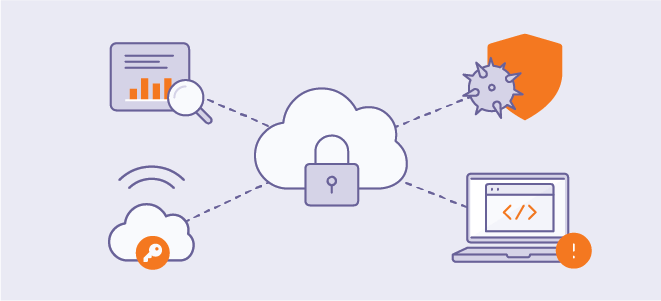Cloud security definition
Cloud security is defined as all aspects of protecting cloud-based data and systems – anything that you store or run from remote servers accessible via the internet. It comprises policies and procedures, cloud antivirus solutions, and authentication controls, such as password protection and user access.
Businesses use cloud security to protect customer and commercially sensitive data, and meet compliance regulations. The specific requirements vary depending on the company size, industry, and volume of data stored in the cloud. In medium- and large-sized businesses, the IT team will manage the relevant configurations in partnership with a security solution provider.
Why is cloud security important?
As with any type of computing, using the cloud for your business comes with risks. While cloud-based computing is typically considered to be safer than traditional computing, there are numerous instances of high-profile hacks. In 2012, when cloud computing was in its infancy, file-sharing site Dropbox announced that it had been targeted by cybercriminals. The perpetrators successfully stole 68 million passwords, which were then sold on the dark web.
Since then,cloud computing securityhas advanced enormously, but risks remain as cybercriminals develop new forms of network attack.
Data breaches are not always the result of criminal activity. They can also occur through negligence or human error. For example, employees that access the cloud from unsecured devices or in a public place can expose confidential data. 2019 saw 108 million betting records exposed due to provider Elasticsearch not password-protecting their server.
Your business data is also accessible only through your cloud service provider (CSP). If the provider has issues with internet connectivity, you may not be able to access your files when needed. Additionally, with little or no consideration to cloud data security and no exit strategy for when you want to change CSPs, you risk temporary or permanent loss of data.
How does cloud security work?
Cloud security services work by bringing together a range of protective measures to keep your business data safe. Due to the nature of cloud technology, this involves, but is not limited to, antivirus. Cloud computing differs from traditional computing in that data is not stored locally, such as on laptops or mobiles. That means that security solutions must be applied to an entire network, rather than to individual devices.
Cloud-based security works to protect online access to files, blocking traffic from suspicious and unauthorized users. Private clouds, for example, will keep your data separate from other files managed by the provider. This can help with resource issues that cause temporary access problems, such as too many people using the cloud provider’s service at the same time.

Data encryption– coding files so that a virtual key is required to access them – is another important aspect of cloud computing and security. It is usually a shared responsibility between the cloud service provider and the business. Security software allows only legitimate users and applications to attempt to decipher the encryption. This also protects data in transit, for example when you share files.
Importantly, cloud security is an integral part of compliance. The ability to access the cloud from any compatible, internet-enabled device brings with it a need for tighter data control.
Regulations such as GDPR in the European Union are therefore an important consideration when using the cloud.
Centralizing your data security
It can be hard to manage the security of data in the cloud as it has no perimeter – it’s not a simple case of adding an antivirus solution to your in-house server. Rather, it comprises strong authorization and data encryption processes. With that in mind, centralized security solutions are ideal for businesses because updates can be applied to the whole network at once.
Centralized cloud network security allows managers to:
-
Make backups from a central point, rather than relying on individual management
-
Apply firewall configurations across the network to manage ingoing and outgoing web traffic
-
Review security threats detected and actioned by antivirus solutions
-
Create and manage device and user authorizations.
Reducing costs and admin
Cloud security systems are a cost effective option for businesses that use cloud services. It requires little human input as security threats are managed proactively, with the system engineer or manager taking on a monitoring role. That frees up resources within the business.
Traditional security measures can be slow to scale as they often need to be applied or configured to individual devices. In contrast, cloud security technologies work by protecting the network and traffic to your cloud data storage – authorizations are applied to devices and users.
In addition, updates from your security provider are automated, saving administrative processes and computer downtime. Other essential measures, such as backing up files and reviewing legacy folders, can also be set to run automatically.
Avast cloud antivirus
Avast Business cloud antivirus offers cloud-based data and online protection for businesses. It can be used via the Avast easy-to-use management platform, which offers a centralized dashboard that enables you to monitor a network of devices at once. Other features include:
-
Firewall – filters traffic and protect against untrusted connections
-
Email shield – scans ingoing and outgoing emails, detecting threats to your device
-
Anti-spam – blocks phishing emails and spam on your device
-
Wi-Fi inspector – checks the connection for vulnerabilities
-
Sandbox – creates a safe environment to test risky files and programs.





%20-%20SMB/What-is-cybersecurity-Thumb.jpg)





%20-%20SMB/How-to-Keep-Your-Facebook-Business-Page-Secure-Thumb.jpg)
%20-%20SMB/What-is-a-data-breach-Thumb.jpg)
